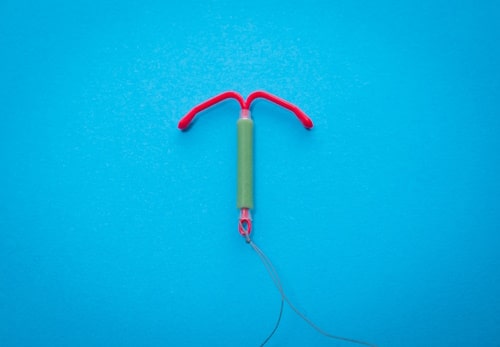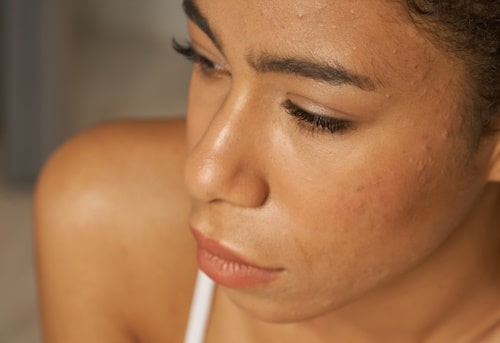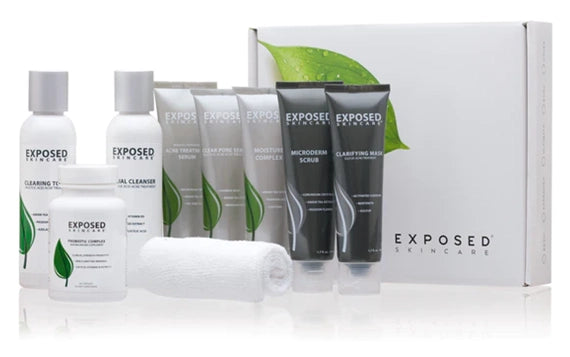Whether you're considering a new form of birth control or recently had a Kyleena intrauterine device (IUD) implanted, you may be pondering a vital question: does Kyleena cause acne?
Acne flare-ups and hormonal imbalances are common concerns for anyone interested in or using hormonal contraception. This article explores various aspects surrounding the link between Kyleena and acne, offering you insights you won't find elsewhere.
Also read: How to choose the best acne treatment
Biggest Take-Aways:
- Hormonal IUDs like Kyleena may contribute to or worsen acne due to their progestin content.
- Non-hormonal options like copper IUDs are generally less likely to affect acne, but individual experiences may vary.
- Understanding the root cause of your acne, especially about IUDs, is crucial for effective management.
- If hormonal contraceptives worsen your acne, Exposed Skin Care offers a comprehensive solution to tackle acne from multiple angles.

What is Kyleena?
Kyleena is a small, flexible intrauterine device inserted into the uterus to prevent pregnancy. It releases a hormone called progestin, specifically levonorgestrel, which helps to prevent ovulation and create a hostile environment for sperm.
Key Features of Kyleena
- Long-lasting: Up to 5 years of contraception
- Hormonal IUD: Contains levonorgestrel
- Intrauterine: Inserted directly into the uterus
- Relatively low hormone dosage: Compared to other hormonal IUDs like Mirena, it has a lower hormone dosage.
The Hormonal Connection: How Hormones Affect Acne
Hormones play a vital role in the formation of acne. The sebaceous glands in our skin are influenced by hormones, particularly androgens, which are male sex hormones. These glands produce sebum, a waxy, oily substance that can combine with dead skin cells and bacteria to clog pores, leading to acne outbreaks.
Common Types of Hormonal Acne
- Cystic Acne
- Chin Acne
- Adult Acne

Does Kyleena Cause Acne: Unpacking the Evidence
You've probably heard conflicting answers to the question, "Does Kyleena cause acne?" While some people rave about clearer skin after getting an IUD, others complain about experiencing acne for the first time or worsening existing acne. So, what's the deal?
Progestin and Its Role in Acne
Progestin, the hormone Kyleena releases, can mimic the body's natural hormones and potentially lead to hormonal breakouts. However, everyone's body reacts differently to hormonal birth control, and not everyone will experience acne as a side effect of IUDs.
Comparison with Other IUDs
- Mirena: Like Kyleena, Mirena also releases levonorgestrel but in higher doses. Many find that Mirena has a stronger association with acne.
- Copper IUDs (Paragard): Copper IUDs like Paragard are non-hormonal and generally do not contribute to acne.
- Skyla: Similar to Kyleena but with a shorter lifespan and a lower hormone dose. Skyla may or may not trigger acne, depending on individual sensitivities.
Acne Management: Coping with IUD-Related Acne
If you find that Kyleena worsens your acne, you may wonder what you can do to keep it under control. It's essential to stick to a comprehensive skincare routine and consider trying acne treatment that suits your skin type.
The Right Acne Treatment
- Salicylic Acid: This ingredient is excellent for spot treatment and unclogging pores.
- Topical Acne Products: Consider products designed explicitly for hormonal acne.
- Diet and Hormonal Acne: There's a link between diet and hormonal acne, so you might consider a dietary change to help manage acne.

Skin Care Routine to Manage Acne
- Cleanse: Wash your face twice daily to remove excess oil and dead skin cells.
- Exfoliate: Use products that promote new skincare without irritating your skin.
- Hydrate: A good moisturizer balances the skin's oiliness without clogging your pores.
Is Switching Birth Control the Answer?
If you find that Kyleena has negatively impacted your skin, you may consider another form of birth control. Before deciding, evaluate what’s going on with your skin and consider the types of acne you're dealing with.
Types of IUDs as Alternatives
- Copper IUDs: Copper IUDs like Paragard are a hormone-free option.
- Hormonal IUDs Like Mirena: If you're already prone to acne, it might be wise to avoid hormonal IUDs that contain higher doses of hormones.
- Oral Contraceptives: Combined oral contraceptives can sometimes improve acne but come with side effects.
Managing Acne with Exposed Skin Care
If hormonal IUDs and acne are not a good mix for your skin, Exposed Skin Care can offer an effective solution to manage your breakouts. This product line is designed with advanced scientific ingredients and natural extracts and addresses various skin issues, especially acne.
The benefits of Exposed Skin Care are:
- Comprehensive Treatment: Unlike products that treat the skin with harsh acne products, Exposed Skin Care offers a well-rounded approach that involves cleansing, toning, and treating.
- Balanced Formula: The products contain proven scientific ingredients like salicylic acid and natural extracts, offering the best of both worlds.
- Adaptable: Whether your hormonal acne is still persistent after getting an IUD removed or you're dealing with the impact of hormonal imbalances caused by hormonal IUDs, Exposed Skin Care can adapt to your needs.
If you're wary of the relationship between hormonal IUDs and acne or are concerned that an IUD may trigger acne due to estrogen or progesterone imbalances, Exposed Skin Care offers a reliable way to minimize the risk of acne.
Conclusion
The question "Does Kyleena cause acne?" elicits various responses depending on individual experiences and hormonal sensitivities. While it's not definitive, evidence suggests that hormonal IUDs may contribute to or worsen acne in some people.
Hormones like progestin in Kyleena and androgen hormones naturally occurring in the body interact with sebaceous glands to possibly exacerbate acne. Conversely, non-hormonal options like a copper IUD tend to have less impact on skin conditions.
Understanding the cause of your acne is the first step in effective management. With hormonal birth control options like Kyleena, the hormonal IUD may contribute to skin issues. If you find that IUDs can cause or worsen acne, a hormonal evaluation and potential switch in contraceptive methods might be considered.
If hormonal contraceptives negatively affect your skin, Exposed Skin Care offers a comprehensive skincare routine designed to help with hormonal acne. The products contain a blend of natural and scientific ingredients that tackle acne caused by various factors.
Managing acne is challenging, especially when hormonal birth control methods are involved. Yet, with a targeted approach to skincare and potential adjustments in contraceptive choices, you can navigate this complex landscape more confidently.
FAQs
Does Kyleena Cause Acne?
It's possible. Some individuals have reported experiencing acne after getting a Kyleena IUD, but experiences vary.
What Role Do Hormones Play in IUD Acne?
Hormonal IUDs like Kyleena contain progestin, which can influence sebaceous glands and lead to acne.
Are Copper IUDs a Better Choice for Acne-Prone Skin?
Copper IUDs don't contain hormones, making them less likely to worsen acne, but individual reactions differ.
Is Acne the Only Side Effect of IUDs?
No, other side effects can include cramping, irregular periods, and spotting, among others.
Can I Do Anything to Manage IUD-Induced Acne?
Yes, a targeted skincare routine like Exposed Skin Care can effectively manage hormonal acne caused by IUDs.



















